Stone benchtops are elegant and are a popular choice for wet areas like kitchens, laundries and bathrooms due to their durability, timeless appeal, and resistance to heat and scratches. Whether you have a granite, marble, quartz, travertine or engineered (man-made) types of stone benchtop, proper maintenance is critical to extend its life and preserve its beauty. Stone surfaces are usually easy to care for if you follow some basic guidelines. In this blog, we will share the complete guide to maintaining your stone benchtop and ensuring it remains in pristine condition for years to come.
First, lets understand what stone is:

Marble Benchtops:
Composition: Marble is a natural stone primarily composed of calcite minerals, which give it a unique veined appearance.
Appearance: Marble is known for its elegance and classic beauty and comes in a wide range of colours, from white and cream to darker shades like green and black, with beautiful veining patterns.
Durability: Marble is softer and more porous than granite, and engineered stone. Making it susceptible to scratches, stains, and etching from acidic substances like vinegar and citrus.
Maintenance: Marble benchtops require more frequent sealing and careful maintenance to protect against stains and etching. Acidic substances should be cleaned up immediately to prevent damage.
Suitable For: Marble benchtops are best suited for low-traffic areas or homeowners who appreciate the natural aging and patina that develops over time.
Granite Benchtops:
Composition: Granite is a natural igneous rock that consists of various minerals, including quartz, feldspar, and mica. It is one of the hardest natural stones available for benchtops.
Appearance: Granite offers a broad array of colours and patterns, ranging from speckled and mottled to uniform and veined designs.
Durability: Granite is highly durable and resistant to scratches, heat, and stains when properly sealed. It is more resilient to acidic substances than marble.
Maintenance: Granite benchtops require periodic sealing to maintain their resistance to stains. Cleaning regularly with mild soap and water is usually sufficient for maintenance.
Suitable For: Granite benchtops are ideal for high-traffic areas like kitchens due to their durability and resistance to wear and tear.
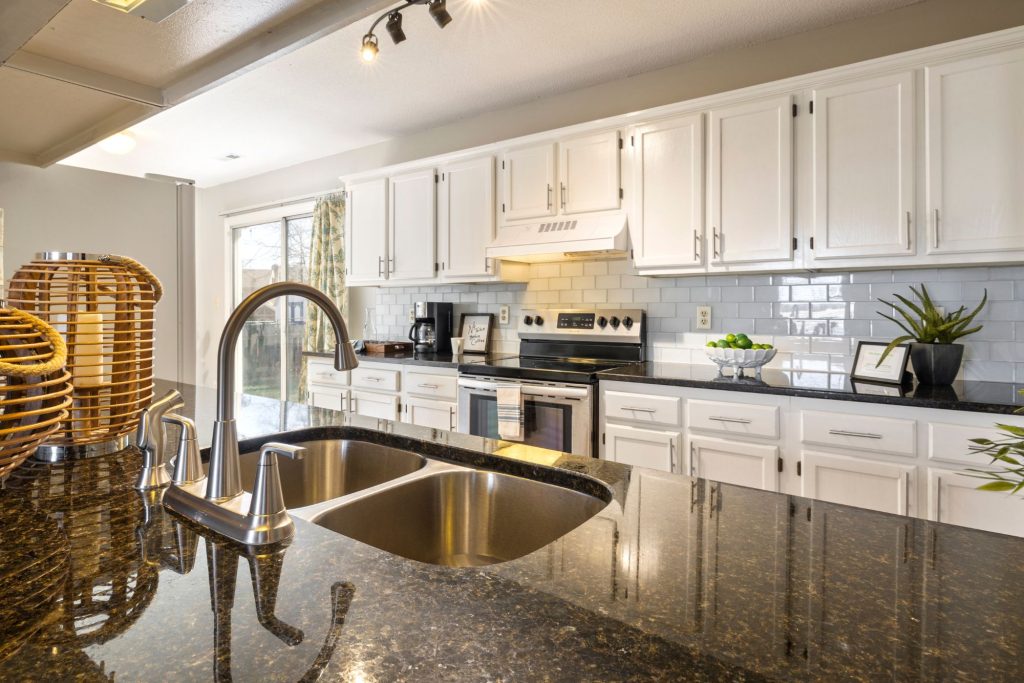
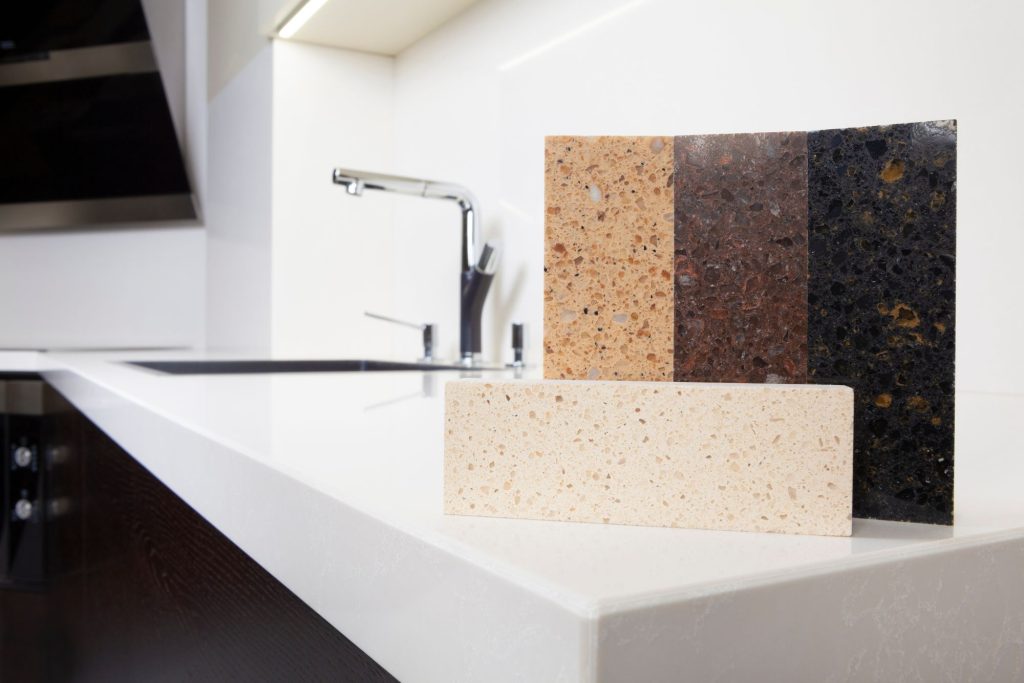
Engineered (Man-Made/Quartz) Stone Benchtops:
Composition: Man-made stone benchtops, such as quartz, are engineered using a combination of natural quartz crystals and resins, often with added pigments for colour.
Appearance: Engineered stone benchtops offer a wide variety of colours and patterns which can replicate the look of natural stone or provide a more consistent appearance.
Durability: Engineered stone benchtops are highly durable and resistant to scratches, stains, and heat. They are less porous than natural stone, making them more hygienic and easier to maintain.
Maintenance: Engineered stone benchtops are non-porous and do not require sealing. Although the answer is technically no they don’t need to be sealed. There are benefits to sealing a man-made countertop, like with natural stone countertops such as marble countertops, a sealant adds extra protection from damage. Routine cleaning with mild soap and water is usually sufficient to keep them looking pristine.
Suitable For: Engineered stone benchtops are well-suited for busy kitchens and bathrooms, offering a low-maintenance and aesthetically pleasing option.
Travertine tiles:
Composition: Travertine can vary somewhat depending on where it was quarried. These can include, calcite, dolomite, quartz and various clay minerals, plant matter and sometimes even fossilised remains.
Appearance: Travertine comes in a range of colours, it often features small pits, holes, irregularities such as veining, swirls, and natural patterns which are a result of the stone’s formation process. Some travertine tiles may have a smoother, honed finish, while others retain a more rustic, textured look.
Durability: Durability varies depending on the type of travertine. While a durable material, it may not be as impervious to damage as some other stone options, it is essential to follow care and maintenance guidelines to ensure longevity.
Maintenance: Proper maintenance, such as regular sealing with a stone benchtop cleaner, can enhance the durability of travertine. Sealing helps protect the stone from stains and moisture penetration.
Suitable For: Travertine tiles are a popular choice for flooring, countertops, backsplashes, walls, fireplaces, outdoor pavers, pool surrounds, sinks and vessels and much more.
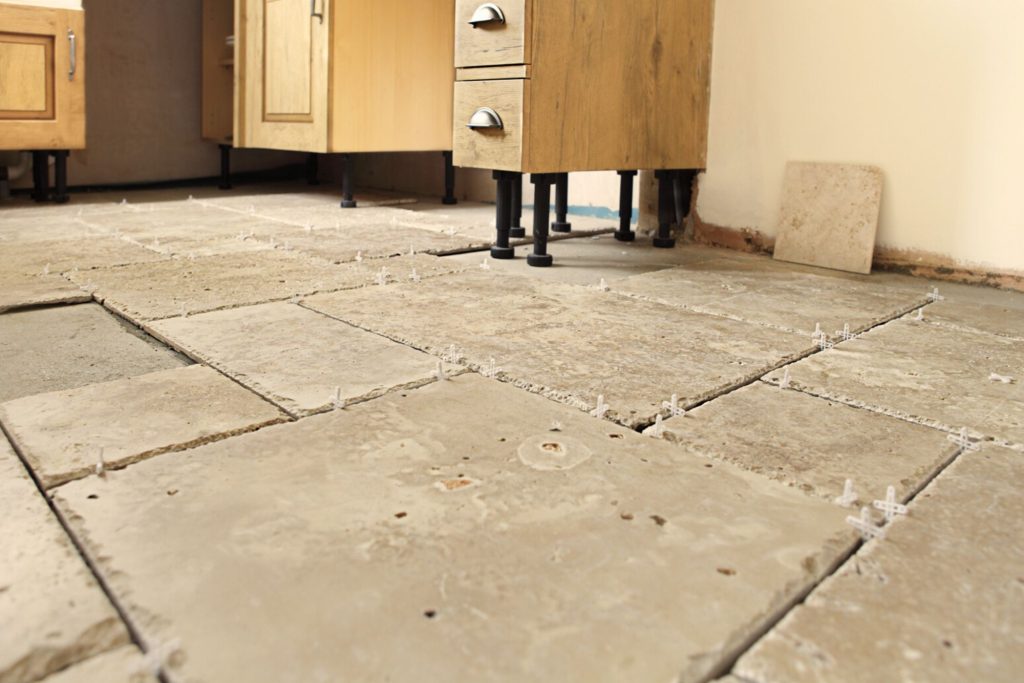
The Difference between polished and honed stone
The primary difference between polished and honed stone benchtop surfaces lies in their appearance, texture, and maintenance requirements. Let’s explore the distinctions between polished and honed surfaces:

Polished Finish:
Appearance: A polished finish has a glossy, reflective surface that enhances the natural colors and veining of the stone. The high shine gives the stone a vibrant and luxurious look, making it an excellent choice for creating a visually striking and elegant ambiance. Not to be confused with sealing where a protective coating is applied to the surface.
Texture: The polished finish is achieved by using fine abrasives to buff the stone’s surface, resulting in a smooth, reflective, and mirror-like appearance.
Characteristics:
High Sheen: The glossy appearance of polished surfaces creates a brilliant and eye-catching effect.
Enhanced Colors: The reflective quality intensifies the stone’s inherent colors and patterns.
Slippery: Polished surfaces can be more slippery, especially when wet, making them less suitable for certain applications like flooring in high-traffic areas or bathrooms.
Maintenance: Polished surfaces are relatively easy to clean and maintain, especially if they are sealed. Regular wiping and cleaning are required to preserve the shine and keep the surface free from debris.
Honed Finish:
Appearance: A honed finish has a smooth, matte, and non-reflective appearance. It provides a softer, more subdued look that highlights the natural beauty of the stone without the glare of a polished surface.
Texture: The honing process involves grinding and sanding the stone to create a uniform and matte texture.
Characteristics:
Matte Surface: The lack of a glossy sheen gives the stone a more understated and elegant aesthetic.
Natural Color: Honed surfaces maintain the stone’s natural color and veining without the added reflection.
Less Slippery: Honed surfaces offer better traction and are less slippery than polished surfaces, making them suitable for flooring and certain wet areas.
Maintenance: Honed surfaces are generally more forgiving in terms of showing wear and tear compared to polished surfaces. While they are still porous and require sealing, they may not need as frequent resealing as polished surfaces to maintain their appearance
Choosing between polished and honed
The choice between polished and honed finishes depends on personal preferences, the desired aesthetics for your space, and the intended use of the stone. Polished finishes are often favored for their stunning appearance and ability to elevate the ambiance of a room, while honed finishes offer a more subtle and low-maintenance option with better slip resistance.
Ultimately, both finishes have their merits, and the decision will be based on the specific requirements and design vision for your project.
Should stone benchtops be sealed?
Yes, natural stone benchtops should be sealed to protect the surface from stains, moisture infiltration, and potential damage. Sealing is especially important for natural stones like marble, granite, limestone, and some types of quartz, as they are porous and can absorb liquids and stains if left unsealed. And, it won’t hurt to seal engineered (man-made/quartz) benchtops to give that added protection.
Sealing creates a protective barrier on the stone’s surface, reducing its porosity and making it more resistant to spills and stains. It helps to prevent liquids, oils, and acidic substances from penetrating the stone and causing permanent damage. Sealed stone benchtops are also easier to clean and maintain, as spills can be wiped up before they have a chance to seep into the stone. The frequency of resealing depends on the type of stone and the level of use the benchtop receives. To ensure proper sealing and maintenance of your stone benchtop.
Follow Manufacturer Recommendations: Always follow the manufacturer’s guidelines regarding sealing and maintenance to preserve the warranty and keep the benchtop in optimal condition.
Use the Right Sealer: Choose a high-quality sealer specifically designed for the type of stone used in your benchtop. Different stones may require different types of sealers, so it’s essential to use the correct product.
Clean Before Sealing: Before applying a sealer, thoroughly clean the benchtop to remove any dirt, stains, or residue. Allow the benchtop to dry completely before applying the sealer.
Apply Sealer Evenly: Follow the instructions on the sealer’s packaging to ensure proper application. Use a clean cloth or applicator to apply the sealer evenly across the entire surface of the benchtop.
Wipe Off Excess Sealer: After applying the sealer, wipe off any excess product to avoid leaving streaks or a sticky residue on the stone.
Allow Adequate Drying Time: Give the sealer sufficient time to dry and cure before using the benchtop. This drying period may vary depending on the type of sealer used.
By properly sealing your stone benchtop and following regular maintenance practices, you can extend its lifespan, maintain its beauty, and protect your investment in this essential part of your kitchen or bathroom.
How to maintain your stone benchtop
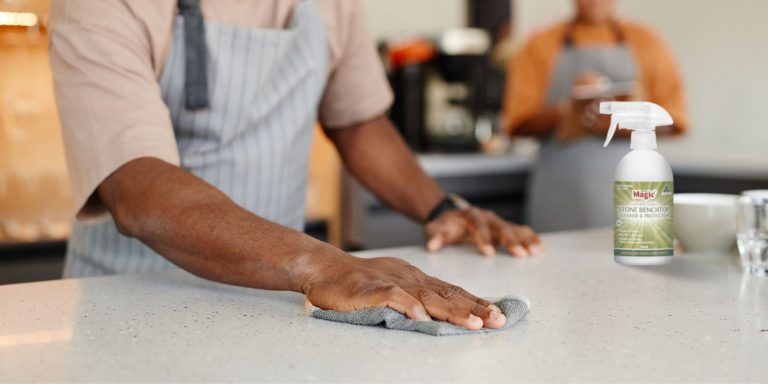
Cleaning your stone benchtop on a regular basis is the first step in maintaining its appearance and hygiene.
Use a soft cloth or sponge: Avoid abrasive cleaners like abrasive pads, rough brushes and scouring agents that can scratch the stone’s surface.
Use a pH-neutral cleaner specific for stone or mild soap: Mix a few drops of mild dish soap with warm water or use a stone-specific cleaner. NOTE: Harsh chemicals or acidic substances like vinegar and lemon juice can damage the stone and its sealant.
Wipe spills immediately: Clean up spills promptly especially acidic substances like vinegar, citrus juices, or wine. These can etch the surface, stain, and cause permanent damage if left unattended.
Regularly clean and maintain the sink area: If your stone benchtop has an integrated sink, make sure to keep it clean and dry to avoid water damage and staining.
While stone benchtops are durable, they are not indestructible, it can chip or crack if something is dropped on them. Be careful when handling heavy objects near the benchtop. To maintain their beauty, be cautious of the following:
Avoid dropping heavy objects: Dropping heavy cookware or utensils on the benchtop can cause chips or cracks.
Use cutting boards: Never cut or chop directly on the stone surface. To prevent scratches and heat damage, always use cutting boards for chopping and trivets or hot pads under hot cookware or dishes.
Hot pads or trivets: Place hot pans or pots on hot pads or trivets to prevent heat damage to the stone.
Use coasters and placemats: When placing glasses, cups, or dishes on the benchtop, use coasters or placemats to prevent water rings or stains. Your hot cuppa will stay hotter too, as the stone benchtop can draw the heat out of the cup quickly.
Depending on the type of stone and its finish, it may need to be sealed periodically to prevent stains and moisture penetration. If you are unsure if your benchtop came with a protective sealant, ask the supplier. Follow the manufacturer’s recommendations for how often you should reseal. Over time, the sealant can wear off, so it’s crucial to reapply it periodically:
Check the sealant: Perform a water droplet test. Sprinkle a few drops of water on the surface. If the water beads up, the sealant is still effective. If it doesn’t bead or soaks into the stone, it’s time to reseal.
Reseal as needed: Follow the manufacturer’s guidelines or seek professional assistance to reseal the benchtop when required. There are different types of sealant, some provide a shiny finish and others provide a matte finish.
Despite your best efforts, stains may occasionally occur. Here’s how to tackle common stains:
Blot the spill: Use a clean cloth to blot the stain gently. Avoid spreading the stain further and don’t rub.
Use a poultice: For stubborn stains, create a poultice by mixing baking soda and water until it forms a thick paste. Apply the poultice to the stain, cover with plastic wrap, and let it sit overnight. Rinse and repeat if necessary.
The colour of the stone may fade over time if exposure to direct sunlight for a long period. And, stone can get very hot if you have a dark colour. Consider using curtains or blinds to protect your benchtop from excessive UV exposure.
Don’t sit or stand on the benchtop: Stone benchtops are not designed to bear heavy loads like a person’s weight, so avoid sitting or standing on them.
Avoid leaving metal objects on the benchtop: Iron or steel items can rust and leave stains on the stone surface. Remove them promptly or place them on a protective surface.
Periodic professional maintenance: Depending on the wear and tear your benchtop experiences, it might be beneficial to have a professional stone cleaner or restorer periodically maintain the surface to keep it in top condition
Summary:
Maintaining your stone benchtop is relatively simple and, with proper care, it will remain a stunning centerpiece in your kitchen or bathroom for many years. Regular cleaning, avoiding harsh impacts, resealing as needed, and protecting from direct sunlight are key to preserving its beauty and integrity. By following these guidelines, you’ll enjoy a functional and visually appealing stone benchtop that continues to enhance the aesthetics of your home.
How can Magic help?
1. Anti-Bacterial Stone Benchtop Cleaner & Protector – Ideal for daily use on engineered stone (manmade), marble, granite and sealed stone use. Perfect or kitchen and bathrooms.
- Cleans, protects & restores shine
- Removes 99.9% of germs
- pH neutral (6.8) safe for sealed & unsealed stone surfaces
- Prolongs the life of your stone benchtop
2. Multi-Purpose Microfibre Cleaning Cloth – Perfect for all your cleaning needs and its made from high-quality microfibre, is lint-free, non-abrasive and perfect for all your household surfaces.
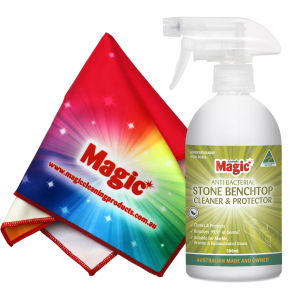
Handy information:
- Bonos Marble & Granite stonemason – Natural vs. Engineered stone for bench-tops: https://canberramarbleandgranite.com.au/articles/natural-vs-engineered-stone-for-bench-tops/
- Stone & Tile Studio – Everything you need to know about travertine: https://stoneandtilestudio.com.au/blog/everything-need-know-travertine-stone-tiles/
- Granite world – 5 Easy Tips To Care For Your Stone Benchtops: https://graniteworld.com.au/5-easy-tips-to-care-for-your-stone-benchtops/
- G.M.S Werks – Polished vs. Honed Natural Stone – Which Should You Choose?: https://www.gmswerks.com/blog/article/polished-vs.-honed-natural-stone-which-should-you-choose
- Granite Stone- What Is Granite?: https://granitestone.com.au/granite/
- Stone Tech – About Reconstituted Stone: https://www.stone-tech.com.au/reconstituted-stone-products/
- Made in Stone: 5 Care Tips to Protect Exterior Stone Benchtops: https://madeinstone.com.au/5-care-tips-to-protect-exterior-stone-benchtops/
